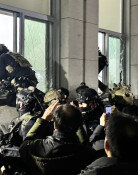Invincible weapons
Invincible weapons
Posted April. 18, 2023 08:00,
Updated April. 18, 2023 08:00

On April 27, 1522, on a plain called Bicocca located in the north of Milan, Italy, the French Armed Forces, Habsburgs, Papal States, and Spanish allies faced off against each other. On the day, the French had an invincible weapon that promised victory. In the 16th century, mercenaries were the difference between victory and defeat in European wars, and the Swiss mercenaries were the most expensive and guaranteed check for victory. They invented the axe-lance battle formation, an invincible formation that could crush any European army, even the charge of a heavily armed knight.
The Swiss art of warfare was not easily imitated by other nations. The extraordinary will to fight, the sense of professionalism that united the soldiers, the confidence provided by so many victories, and the harshness of life back home all contributed to the legend of the Swiss mercenaries.
The Allies dug up the dirt from the ditch to create a hastily constructed hill, where they took up positions and solidified their defenses. On top of the mound, they placed cannons, a new weapon on the battlefield, and in front of them, troops of flintlocks. Some 8,000 Swiss troops advanced on the Allies from the front. When the gap between the two armies reached 270 meters, the Allies fired their cannons. The Swiss suffered heavy losses, but the Allies could not halt their courage and advance. As the line reached the ditch, musket fire and smoke filled the battlefield. In an instant, acrid smoke enveloped the battlefield. Soldiers couldn’t see anything, but the screams, groans, and smell of blood were telling what was happening. The massed formations of the Swiss maximized the power of their guns and cannons.
With the advent of guns and cannons came a frighteningly fast pace of weaponization. New weapons have been introduced in all kinds of wars, such as the Gulf War, the Afghanistan War, and Russia’s war against Ukraine. What is relatively slow is human consciousness and ego. When I was in college, I read an article about cruise missiles as the weapon of the future, which ended on a skeptical note. But less than a decade later, the Gulf War broke out, and cruise missiles took center stage.
We live in a world of our own making, with too many people with insufficient knowledge and too many people who think they are right. What did the Swiss soldiers believe that day?







